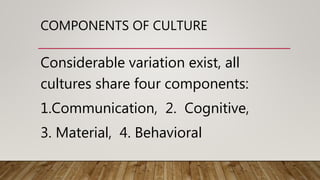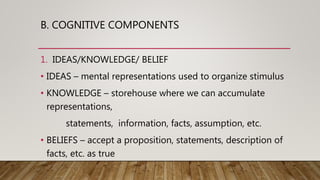Components of culture
- 1. COMPONENTS OF CULTURE Considerable variation exist, all cultures share four components: 1.Communication, 2. Cognitive, 3. Material, 4. Behavioral
- 2. A. COMMUNICATION COMPONENT 1.LANGUAGE â defines what it means to be human, it forms the core of all culture. 2.SYMBOLS â form of backbone of symbolic interaction
- 3. B. COGNITIVE COMPONENTS 1. IDEAS/KNOWLEDGE/ BELIEF âĒ IDEAS â mental representations used to organize stimulus âĒ KNOWLEDGE â storehouse where we can accumulate representations, statements, information, facts, assumption, etc. âĒ BELIEFS â accept a proposition, statements, description of facts, etc. as true
- 4. 2. VALUES â defined standards of desirability, goodness, and beauty, which serve as broad guidelines for social living. 3. ACCOUNTS â sharing of cultures, common language for talking about their inner selves. C. BEHAVIORAL COMPONENTS ( how we act ) NORMS â are rules and expectations by which a society guides the behavior of its member
- 5. TYPES OF NORMS âĒ MORES â are customary behavior patterns or folkways which have been taken on a moralistic values âĒ LAWS â constitute the most formal and important norms âĒ FOLKWAYS â are behavior patterns of society which are organized and repetitive âĒ RITUALS â these are highly scripted ceremonies or strips of interactions that follow a specific sequence of action
- 6. MATERIAL COMPONENTS OF CULTURE - refer to a physical object of culture such as machines, equipment, tools, books, clothing, etc.





